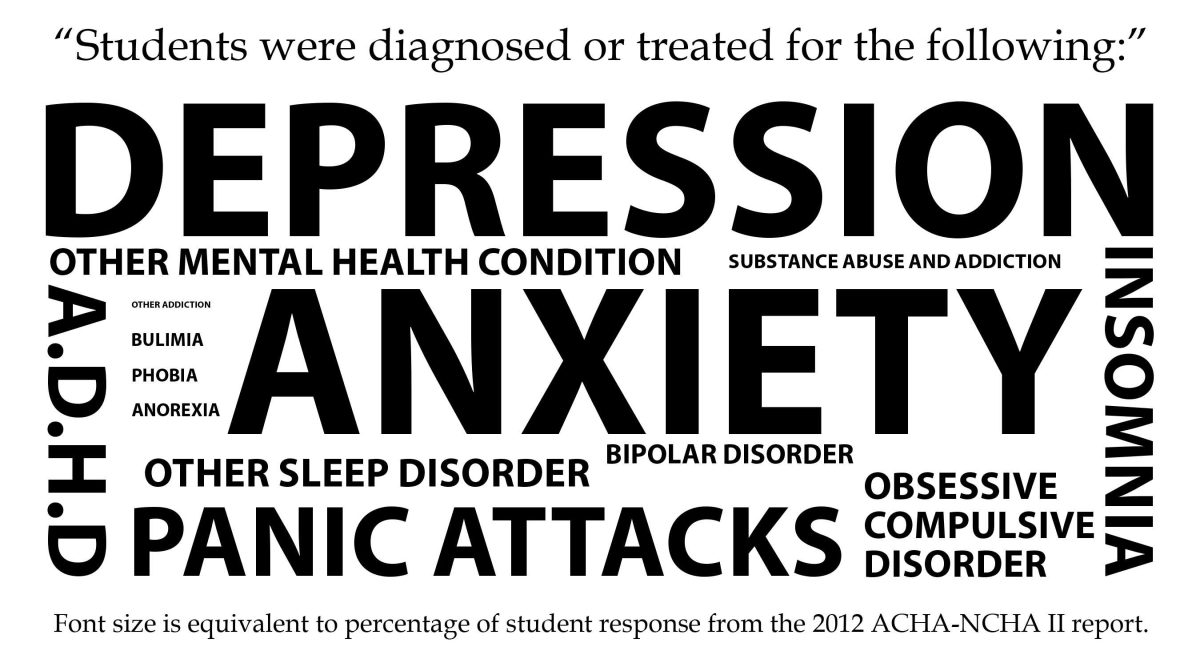Left unsaid: Rising need for mental health services on college campuses
Editors Note: This is part one of a three part series on mental health in community colleges.
If you’ve recently felt depressed, alone and overwhelmed, if you’ve felt anxious and hopeless, you’re not alone.
Lives are built and spent on college campuses, and while to a casual observer the fall leaves and sunny days of Cosumnes River College may well seem serene, statistics indicate that many students on campus are struggling with one or many issues that are negatively impacting their mental health and academic performance.
“There are an increasing number of students with serious psychological problems,” said Dr. Shannon Dickson of California State University, Sacramento, during the Eighth Annual Fall Ethics Symposium on Mental Health on Oct. 23.
Dickson, a counselor at both CSUS and CRC, shared the panel with the Vice President of Student Services and Enrollment Management, Celia Esposito-Noy.
“What happens outside of campus also happens on campus, meaning, there are students, there are faculty, there are staff and administrators who may indeed have some mental challenges,” Dickson said.
Stress, sleep difficulties, anxiety and depression were only a few in the long list of factors that students reported were negatively influencing their academic performance on campus, according to the Spring 2012 American College Health Association National College Health Assessment II, one of the most recent reports studying the mental health of undergraduate students in the United States.
Of the 76,481 students who responded to the survey, 58 percent said they had felt very lonely, 46 percent said they felt things were hopeless, 43 percent said they had felt “more than average stress” and 7 percent had seriously considered suicide, according to the 2012 ACHA-NCHA II report.
These pressures, along with external factors like limited support systems, personal or family history of substance abuse, chronic stress and peer coping abilities contribute to the overall mental health of a student, Dickson said.
“These risk factors in and of themselves don’t mean anything,” she said. “But when you put these risk factors together, that is when you are going to increase the probability that the student will not matriculate, and it puts the student at a higher risk for developing a mental disorder.”
The ACHA-NCHA report goes on to detail various diagnoses and treatments that students had received within the past year, of which, anxiety (11.6 percent), depression (10.6 percent) and panic attacks (5.5 percent) were the top three.
“Here we have these mental health needs that many colleges feel they are not responsible for,” Esposito-Noy said.
While students at CRC have mental health services through the counseling department, statewide, more than 16 percent of campuses lack services. On average, 26 percent of the funds received from health fees are allocated to mental health services for colleges, according to the 2013 Capacity Survey of Mental Health Services Baseline Report from the California Community Colleges Student Mental Health Program.
However, simply because a campus is offering mental health services, it does not mean a student who needs assistance will actively seek them out.
Mental health has a history of being stigmatized and it is these notions, in combination with social pressures and previous school experiences, which keeps certain students from talking to a counselor, Esposito-Noy said.
“It is important to realize that all of us in higher education did not do this alone,” Esposito-Noy said. “Every single one of us has stories of people and resources that have helped along the way. Because, if we hadn’t of been helped, we probably wouldn’t have completed the degrees that we had.”
If you or a loved one is depressed, having thoughts of suicide or in need of mental health services, call the Suicide Prevention Crisis Line: 1-916-368-3111 or 1-800-273-8255.
Want to share your experiences with CRC’s mental health services? Email the writer: [email protected]

